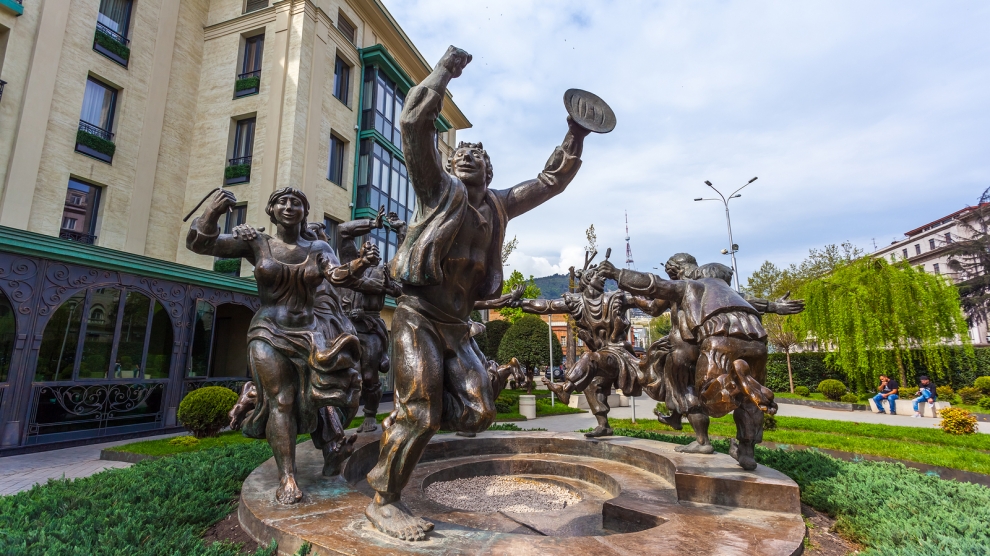I first visited Georgia for a period of three weeks in 2007, and moved here on a permanent basis in 2011. My attraction was instant, although what it was I found so appealing was initially difficult to define – I eventually concluded that it was the people, or their national spirit, and the way in which they had experienced hardships beyond my comprehension. I was fortunate enough to be raised in a privileged household and sent to an expensive private school, and as a 16-year-old on my first visit to Georgia, meeting people of a similar age who had seen war, poverty and political turmoil was eye-opening. To put it another way, it did not compare with my other experiences abroad, in which I had infested some of the nicest and most scenic parts of Europe, the United States and Japan.
I returned to England and school a changed youth, feeling nothing but a desire to go back to what I decided was the ‘real’ world, and no doubt behaving like an American war veteran back from Vietnam. I lost interest in the trivia of adolescent life at my posh school and spent my evenings reading whatever I could find about Georgia, and even ordered an outdated Georgian phrasebook from an obscure American website, at certain risk (I felt) of having my bank details and identity stolen.
Nothing deterred me from my dream to return to Tbilisi: not my parents’ scepticism, nor my friends’ bemusement, nor the Russian war of 2008, nor the sinister phrases in my Georgian language book (it seemed to recommend I learn: “Help me, I have been raped” and “Are there landmines in this area?” which suggested that Georgia wasn’t Tuscany, exactly). My correspondence with the few friends I made in 2007 became more frequent with the advent of Facebook, and I moved in 2011, finally able to start my life in Tbilisi.
What little I had learnt and seen in my brief visits in 2007 and 2010 had appealed to me greatly, especially as I was exacerbated and frustrated with matters in my own country. Georgians were proud of their history and knew it well; my fellow Britons, especially those of my enlightened generation, knew little of our nation’s history but still apparently felt compelled to feel ashamed of it. Georgians had apparently all but eradicated street violence – I barely felt safe walking to my local corner shop. Georgians were friendly; Britons were cold.
I had it in my head at this point that Georgia was a little nation that, against the odds and under the radar, had somehow managed to get it all right. It took me some time to notice the cracks: the streets might not be dangerous, but domestic violence against women was (and is) a major issue; their friendliness and much-vaunted hospitality lasted until the point of disagreement; and their knowledge of their history and traditions was used to justify discrimination against sexual minorities. It was clearly not the social utopia that I had initially believed it was.
But nowhere is perfect, as I came to realise, and there was still much to like about Georgia, not least because for Western foreigners it was a land in which one could do anything. During my years here I have worked as a teacher of English (conversation classes, mostly, which is like being a poorly paid chat-show host), boxing coach, university lecturer, actor (for a soap opera nobody saw and a product that turned out to be a hoax, both roles given due to nobody else wanting the job), and – best of all – a journalist, which I describe as my main career. My work in media has led my name to being published in newspapers in England and America, as well as being invited to discuss politics on Georgian television, and I also had the honour to be an invited speaker at a conference last year attended by a member of our own House of Lords. I have met both the Georgian President and Prime Minister, both of whom were gentlemen whose conduct contrasted nicely with my experiences of dealing with my MP in Britain, who would barely give me the time of day. This, I suppose, is one of my main (and most selfish) reasons for living in Georgia – there is the chance to do things and live a life that would be inconceivable in my own country.
But I believe it is still a land of great opportunity, and not just for me – my parents remark on their annual visit that the country changes for the better every time they see it. It is, of course, regrettable that so much of Georgia’s future is dependent on foreign powers; coveted EU and NATO membership are yet to be granted, and Russia is becoming increasingly aggressive in its foreign policy.
Domestically, I predict that Georgia will undergo a fracturing of its society, as its vocal minority of young, Western-looking liberals clash with the traditionalist majority. In truth, this has started to happen already, with the populist March of Georgians movement gaining a modicum of traction and the pro-Russia Alliance of Patriots party winning six seats in Parliament.
However, it is important to remember that this sort of social division will not make Georgia much different from its Western allies, especially while Donald Trump occupies the White House. What Georgia needs now is patience – its Western aspirations may still take time, but it is becoming increasingly popular as a tourist destination, and its location on the New Silk Road could see it reap major economic benefits. The future is bright and will remain so – providing Russia does not turn its eyes and armies south.
—
The views expressed in this opinion editorial are the author’s own and do not necessarily reflect Emerging Europe’s editorial policy.

